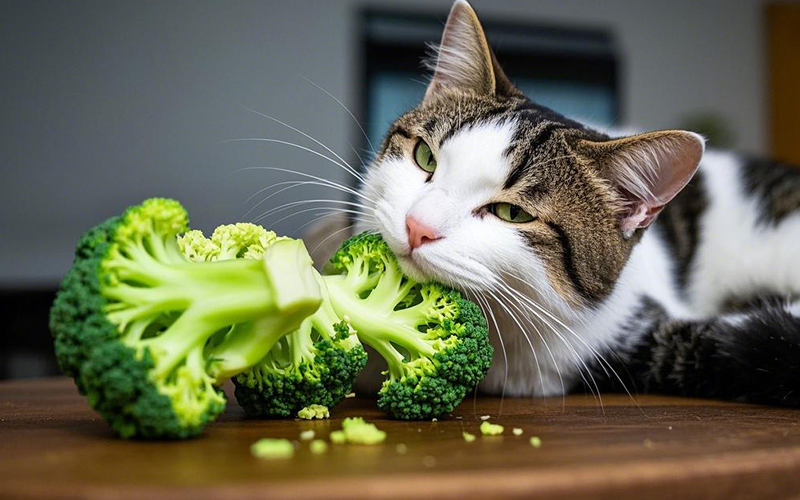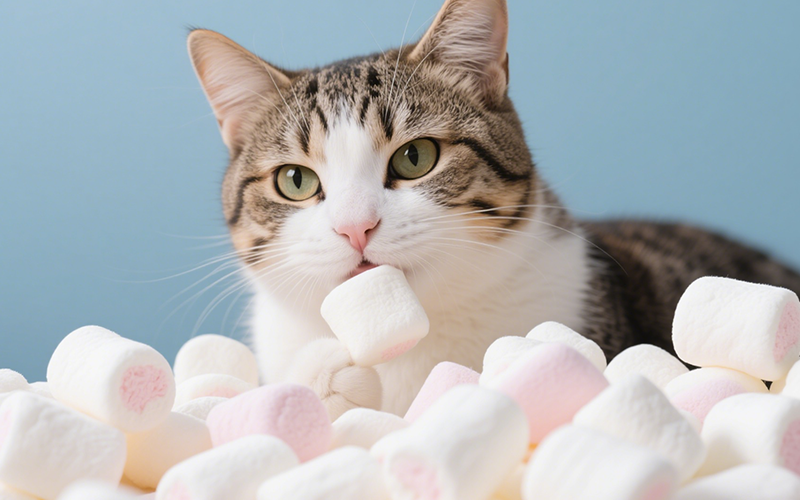Can Cats Eat Cauliflower? A Guide to Safe and Healthy Treats for Your Feline Friend
- 12 Mar 2025 13:44
As a cat owner, you may be curious about whether vegetables like cauliflower can be a safe addition to your cat’s diet. Cats are obligate carnivores, meaning their primary source of nutrition should come from animal-based proteins. However, many cat owners love to share their meals with their pets, so it's important to know which human foods are safe for your feline friend. Can cats eat cauliflower? Let’s explore the benefits and risks of feeding cauliflower to your cat, and how to safely incorporate it into their diet.

The Benefits of Cauliflower for Cats 🥦
While cats don’t require vegetables in their diet, cauliflower can offer some benefits when served in moderation. Here’s why cauliflower might be a healthy treat for your cat:
1. Low in Calories 🏃♂️
Cauliflower is a low-calorie vegetable, making it a great option for cats that need to maintain or lose weight. If your cat is on a calorie-controlled diet, cauliflower can be a healthy and low-calorie snack.
2. High in Fiber 🌱
Cauliflower contains a good amount of fiber, which can help support your cat's digestive health. A small amount of cauliflower can help regulate bowel movements and promote a healthy digestive system.
3. Rich in Nutrients 💪
Cauliflower is a good source of vitamins and minerals, such as Vitamin C, Vitamin K, folate, and potassium. While cats don’t rely on vegetables for these nutrients, a small amount of cauliflower can add variety to their diet and provide trace amounts of these beneficial compounds.
4. Antioxidants 🧠
Cauliflower contains antioxidants, which can help support your cat's overall health and protect cells from damage. These compounds can contribute to a healthier immune system, though your cat will get the most benefits from their regular, well-balanced cat food.
The Risks of Feeding Cats Cauliflower 🚨
While cauliflower is generally safe for cats to eat, there are some risks and considerations to keep in mind:
1. Digestive Upset 🤢
Cats’ digestive systems are not designed to process large amounts of plant matter, so feeding them too much cauliflower can cause stomach upset, gas, or diarrhea. Always offer cauliflower in small quantities and monitor for any signs of digestive distress.
2. Potential for Gas or Bloating 💨
Because cauliflower is high in fiber, it can cause gas or bloating in some cats, especially if they aren’t used to eating vegetables. If your cat experiences discomfort, it’s best to reduce the amount or avoid cauliflower altogether.
3. Choking Hazard ⚠️
If you serve cauliflower in large chunks or pieces that are too big, it could pose a choking hazard for your cat, especially for kittens or small cats. Be sure to cut cauliflower into small, manageable pieces to prevent any accidents.
4. Not a Complete Diet 🍽️
While cauliflower is a healthy treat, it does not provide all the essential nutrients that cats need for a balanced diet. It should never replace a nutritionally complete cat food, as cats require animal-based protein, taurine, and other nutrients that vegetables like cauliflower cannot provide.
How to Safely Serve Cauliflower to Your Cat 🐱
If you decide to offer cauliflower to your cat, it’s important to do so in a safe and responsible way. Here’s how you can serve cauliflower to your cat without causing harm:
1. Cook the Cauliflower 🍳
Raw cauliflower can be harder for your cat to digest and may cause stomach upset. Cook the cauliflower by steaming or boiling it to make it easier for your cat to digest. Avoid adding any seasonings, oils, or butter, as these can be harmful to your cat.
2. Serve in Small Pieces 🥄
Cut the cauliflower into small, bite-sized pieces to avoid any choking risks. Make sure the pieces are easy for your cat to chew and swallow.
3. Moderation is Key ⚖️
Cauliflower should be offered as an occasional treat, not a regular part of your cat’s diet. Limit the amount you serve and ensure it doesn’t exceed 10% of your cat's daily food intake. Overfeeding vegetables like cauliflower can lead to digestive issues or nutritional imbalances.
4. Monitor for Reactions 👀
After offering cauliflower to your cat, watch for any signs of discomfort, such as vomiting, diarrhea, or excessive gas. If you notice any negative reactions, discontinue feeding cauliflower and consult your veterinarian.
Signs That Cauliflower Might Not Agree with Your Cat 🚨
If your cat shows any of the following signs after eating cauliflower, it might be a sign that the vegetable isn’t agreeing with them:
Vomiting or diarrhea
Excessive gas or bloating
Lack of appetite
Lethargy or discomfort
Changes in behavior or mood
If you notice any of these symptoms, stop feeding cauliflower and consult with your veterinarian for further advice.
Healthy Alternatives to Cauliflower for Cats 🐾
If you’re looking for other healthy treats for your cat, there are plenty of safe and nutritious options:
1. Cooked Chicken 🍗
Plain, cooked chicken (without bones or seasoning) is a great protein-packed treat for cats. It’s easy to digest and provides essential nutrients like taurine.
2. Carrots (in moderation) 🥕
Carrots are a crunchy, low-calorie snack for cats. They’re rich in fiber and vitamins, but be sure to cook them first to make them easier for your cat to digest.
3. Cucumber Slices 🥒
Cucumbers are hydrating and low in calories, making them a great snack for cats. They’re also easy to digest and safe for cats in small amounts.
4. Cooked Salmon or Tuna (in moderation) 🐟
Fish like salmon and tuna are a good source of omega-3 fatty acids, which promote a healthy coat and skin. Just be sure to serve them cooked and in small portions, as too much fish can lead to nutrient imbalances.
5. Commercial Cat Treats 🏆
There are many commercially available cat treats formulated to meet your cat’s nutritional needs. Look for treats made with high-quality protein and natural ingredients.
PettureX: Your Pet Health Assistant 🐾
If you’re ever unsure about what foods are safe for your cat or need advice on their diet, PettureX, an AI-powered pet health assistant, is available 24/7 to answer your questions. Whether you’re curious about cauliflower or any other pet-related concerns, PettureX can provide reliable and accurate information to help you care for your feline companion.
Conclusion
Can cats eat cauliflower? Yes, in moderation. Cauliflower can be a healthy and safe treat for your cat if it’s cooked, served in small pieces, and given as an occasional snack. However, keep in mind that cauliflower should never replace your cat's regular, nutritionally complete diet, and always monitor for any signs of digestive issues or discomfort.
If you have any concerns about your cat’s diet or health, don’t hesitate to reach out to PettureX for expert advice and assistance. 🐱🥦
Related

Marshmallows and Cats: A Puffy Problem? Why Vets Say No to This Sugary Snack
- 22 Apr 2025
Kefir for Kitties? A Veterinarian-Reviewed Guide to Safety, Benefits & Risks
- 22 Apr 2025
The Burning Question: Can Cats Eat Jalapenos? A Comprehensive Safety Guide
- 21 Apr 2025
Cool Temptation: Can Cats Eat Ice Cream Safely? The Vet-Backed Truth
- 21 Apr 2025
Frankly Dangerous: Can Cats Eat Hot Dogs? Vet Explains the Serious Risks
- 16 Apr 2025
A Purrfect Protein? Can Cats Eat Ground Turkey Safely? (Vet-Reviewed Guide)
- 16 Apr 2025
Gritty Situation: Can Cats Eat Grits Safely? Vet Explains the Risks
- 16 Apr 2025
Crunchy Query: Can Cats Eat Green Peppers? A Vet-Reviewed Safety Analysis
- 16 Apr 2025
Gravy Danger Zone: Can Cats Eat Gravy Safely? (Vet-Reviewed Warning)
- 16 Apr 2025
Toxic Temptation: Can Cats Eat Grapefruit? Vet Explains the Dangers
- 16 Apr 2025
